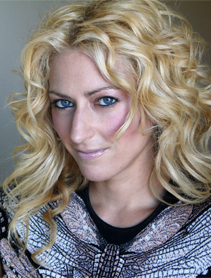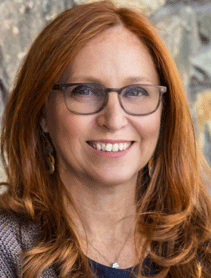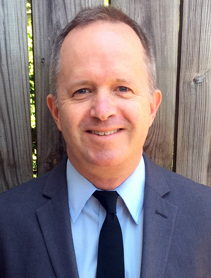HMCSE Distinguished Lecture Series
The Hal Marcus of College of Science and Engineering (HMCSE) launched its first Great Minds Distinguished Lecture Series Spring 2018 with several notable speakers communicating the sciences with the community.
November 16, 2019 - Jane McGonigal
Gaming for a Better World
Pensacola Mini Maker Faire
Museum of Commerce - 1:00 - 2:30 pm
201 E Zaragoza Street, Downtown Pensacola
Hear from the world-renowned game designer, Inventor of SuperBetter, author of the New York Times bestseller, Reality is Broken.
"We can use the same strengths we display playing games to overcome business and individual challenges."

Biography
One of 25 Successful People Who’ll Help Change Your Life in 2018 - Success Magazine
Jane McGonigal is today’s leading speaker on the engagement economy and the application of game-design to the real world. Referencing lessons learned through her work creating games for organizations such as the World Bank, the Olympic Games, the American Heart Association, the New York Public Library, and many more.
Jane is notable for bringing gaming to the healthcare space. Her best-known project is SuperBetter, a mobile app and web-based game that helps individuals challenge personal health challenges (depression, anxiety, chronic pain, stress reduction), and get support from their “allies” — real-life friends and family. With one million players, it is currently under study at OSU Medical Center and the University of Pennsylvania. Jane’s other healthcare games include collaborations with the American Heart Association and the Myelin Repair Foundation.
Jane McGonigal’s current book, SuperBetter: A Revolutionary Approach to Getting Stronger, Happier, Braver and More Resilient (debuted at #7 on the New York Times Advice bestsellers list), reveals a decade’s worth of scientific research into the ways all games change how we respond to stress, challenge, and pain. She shares stories and data from players who have followed the SuperBetter rules to get stronger, happier, and braver in the face of depression, anxiety, illness, and injury.
Her previous book, Reality Is Broken: How Games Make Us Better and How They Can Change The World, is a New York Times bestseller. In this engaging, forward-thinking book, Jane makes the case that the gamer spirit — an attitude of fun, dedicated, collective problem-solving — is our greatest asset as we face the social, economic, and environmental problems of the 21st century.
Jane herself is a specialist in this field, a designer of alternate reality games, where a real-life activity is re-framed as a game. Players of Jane’s games face challenges as serious as surviving peak oil or establishing local sustainable businesses. And they face them with courage and creativity, inspired by their gameful state of mind. Persistence, energy, collaborative creativity, a sense of purpose in hard work — games unlock all of these powerful attitudes. And, most importantly of all, it restores to contemporary life the kind of heroism and communal striving that most of us struggle so hard to find.
She serves as the Director of Game Research & Development with the Institute For The Future in Palo Alto, California.
Past Lectures

September 10, 2019 - Francesca Rossi
AI Ethics for Enterprise AI
IHMC - Reception at 5:30 - Talk at 6:00 pm
40 South Alcaniz Street
Pensacola, Fl 32502
ABSTRACT
AI has the power to amplify human ingenuity, extending our capabilities to help solve the biggest business and global challenges. AI will transform industries, make us more productive and help us enrich the customer and citizen experience. As technology increasingly becomes part of the products and services people use at work and at home every day, the power of AI technology must be balanced with a responsible approach, applying ethics to address societal impacts and build trust. The space of enterprise AI, that is, AI that can be used by companies to improve their operations and augment the capabilities of their professionals, has specific technological and ethical challenges, such as those related to explanations and human-AI communication. In this talk, I will discuss the AI ethics environment that needs to be built in order to define and build trustworthy enterprise AI, by mentioning both internal IBM initiatives and external partnerships.

March 21, 2019 - Howard Kunreuther
A Risk Analysis Framework for Dealing with Climate
Change Now
UWF Campus - 12:15 - 1:30 pm
Building 13, Room 230
ABSTRACT
There has been a growing interest in how decision-makers deal with adverse events that can have catastrophic consequences in the face of climate change. Recent empirical evidence demonstrates that rather than using data from experts, residents in hazard-prone areas misperceive the risk and use simplified decision rules in dealing with low probability high consequence events. This session proposes a risk analysis and risk management framework for dealing with these extreme events. A behavioral risk audit is proposed for improving the decision-making process so individuals and communities have an interest in taking steps now to avoid or reduce the consequences of future hurricanes and flooding that very likely will be intensified due to climate change.
March 21, 2019
Why We Are Underprepared for Climate Change and Ways to Remedy This Problem
Old Christ Church- 6:00 pm
Historic Pensacola, Fl
405 S Adams Street
ABSTRACT
We face challenges in dealing with potentially catastrophic events associated with climate change. Most individuals exhibit systematic biases so they do not think about investing in energy-efficient measures to reduce global warming or undertaking protective actions to reduce damage to their homes from future floods or hurricanes until after a disaster occurs. I will highlight why we ignore these risks and recommend communication strategies coupled with economic incentives so individuals will want to take steps now rather than waiting until it is too late to reduce the risks from climate change and adapt to its consequences.
March 22, 2019
Flood Insurance as a Tool for Resilience: Workshop
IHMC- 9 am to 4 pm
40 S Alcaniz Street
Pensacola, Fl

March 8, 2018 - James Rea
Science Matters: On the Importance of Communicating Science to All
James Rea, Alan Alda Center for Communicating Science
Thursday, March 8, 2018
Institute for Human Machine and Cognition (IHMC)
40 S Alcaniz Street, Downtown Pensacola
While research scientists recognize the importance of transferring knowledge out of labs and off campus, most struggle to share the excitement of their discoveries to non-academic audiences. By using “clear, vivid, and engaging” language and communication methods, the public audience of citizens, media, and lifelong learners can better understand and actually use science to enrich and inform everyday life.
January 18, 2018 - Dr. Nathan Lewis
Where in the World Will Our Energy Come From?
Dr. Nathan Lewis, California Institute of Technology
Thursday, January 18, 2018
Historic Museum of Commerce
201 E Zaragoza Street, Downtown Pensacola
Dr. Nathan Lewis, George L. Argyros Professor of Chemistry of the California Institute of Technology discusses ways energy can become more efficient. The modern heating ventilation and air conditioning (HVAC) systems usually rely on a temperature measurement from a single location to control an entire building, or at least a large portion or zone of the building. More precise control of the system is required to improve user comfort and potentially reduce the power demands of HVAC systems. By designing a smarter control unit capable of utilizing an array of temperature and humidity sensors, the control unit directs valves to regulate air flow into or away from a zone thereby increasing personal comfort and reducing unneeded air conditioning to areas where the desired conditions have already been met. This project utilizes a Raspberry Pi microcontroller to receive data from the temperature sensors and relay commands to servo-controlled in-duct dampers, as well as stepper motor controller vent registers. The system was tested inside a multi-room demo home and was shown to provide an evener temperature distribution compared to the traditional single sensor/control system.
February 16, 2018 - Dr. Jyotika Vermani
XPRIZE: Incentivizing the Next Generation of Technology
Dr. Jyotica Virmani, Ocean XPRIZE
Thursday, February 15, 2018
Historic Museum of Commerce
201 E Zaragoza Street, Downtown Pensacola
Dr. Jyotika Virmani, the senior director of Planet & Environment at XPRIZE, shares the recognization of two significant moments that are currently upon us with profound implications for humanity. First, that individuals are rapidly becoming more empowered to invent and innovate using democratized technologies—e.g., AI, robotics, 3D printing, blockchain, sensors, bio-tech, big data, etc.—that only a few short decades ago were capabilities only afforded by large governments and big organizations. And second, that these individuals are getting digitally connected to one another across the globe, thus enabling the formation of small, powerful, and agile teams that are able to collaborate and innovate in ways we, the human race, have never experienced.
April 6, 2017 - Dr. Nadine Barlow
The Search for Water on Mars
Thursday, April 6, 2017
Museum of Commerce
201 East Zaragoza Street, Pensacola, FL 32502
The author of “Mars: An Introduction to its Interior, Surface and Atmosphere,” Barlow has researched impact craters on Mars, as well as the understanding of Mars’ climate history and Earth’s own climate, past and future. She is a member of multiple scientific societies, including the American Astronomical Society, Division for Planetary Sciences, American Geophysical Union, Planetology Section, Geological Society of America, Planetary Geology Division, International Astronomical Union, Sigma Xi and the Committee on Undergraduate Research.







